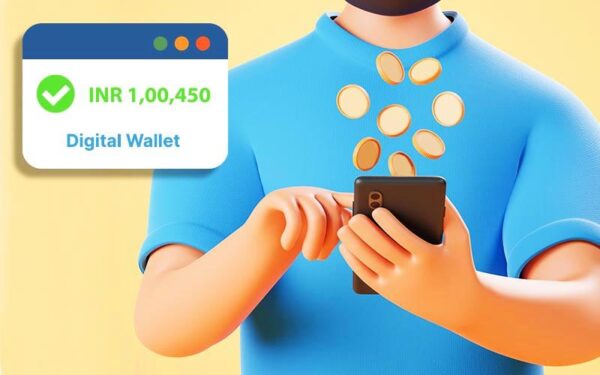Digital Wallets: Redefining the Future of Transactions
In a world increasingly driven by digital advancements, digital wallets have emerged as a transformative force in the financial realm. These cutting-edge tools have redefined how we manage and execute transactions, moving beyond traditional cash and cards to offer a more streamlined and efficient payment experience. Let’s explore the dynamic world of digital wallets and discover how they are reshaping the landscape of financial interactions.
Understanding Digital Wallets:
Digital wallets, at their essence, are applications designed to digitize and simplify payment processes. They store a variety of payment information, including credit and debit card details, loyalty cards, and even digital currencies, directly on your smartphone or other electronic devices. This technology eliminates the need for physical cards and cash, offering a more convenient and secure alternative.

The Surge of Digital Wallets:
Several key factors have fueled the rise of digital wallets:
- Streamlined Convenience:
Digital wallets make transactions as easy as a tap or a scan, whether you’re shopping online or at a physical store. This efficiency appeals especially to younger users who value quick and hassle-free payment methods. - Enhanced Security:
Advanced security features such as biometric authentication, encryption, and tokenization make digital wallets a safer option compared to traditional payment methods. These measures significantly reduce the risk of fraud and theft, addressing critical security concerns. - Tech Integration:
Digital wallets seamlessly integrate with modern technologies like contactless payment systems and mobile banking applications, improving user experience and expanding financial management options. - Cost Benefits for Businesses:
For merchants, digital wallets often come with lower transaction fees compared to traditional credit card processing. Additionally, the smoother checkout process can boost sales and enhance customer satisfaction.
Leading Digital Wallets:
Several digital wallet solutions have made significant strides in the market:
- Apple Pay: Leveraging Apple’s ecosystem, Apple Pay offers a secure and efficient payment method using NFC technology and biometric verification.
- Google Wallet: Google Wallet provides a flexible platform for managing payment details, making transactions, and handling loyalty cards on Android devices.
- Samsung Pay: Samsung Pay distinguishes itself with Magnetic Secure Transmission (MST) technology, enabling it to work with both traditional and contactless payment terminals.
- PayPal: A pioneer in digital payments, PayPal’s wallet feature allows users to store and use payment information across various platforms, including e-commerce and peer-to-peer transactions.
- Cryptocurrency Wallets: For those interested in digital currencies, wallets like Coinbase Wallet and MetaMask offer secure storage and management of assets like Bitcoin and Ethereum.
Looking Ahead: The Future of Digital Wallets
The future of digital wallets is bright and full of potential, with several exciting trends on the horizon:
- Personalized Experiences:
Future digital wallets will offer more tailored experiences, such as customized offers and spending insights based on individual preferences and behaviors. - Integration with Emerging Tech:
Digital wallets are set to integrate with emerging technologies like artificial intelligence and blockchain, enhancing their functionality and security. - Broadened Applications:
Beyond payments, digital wallets will increasingly serve diverse functions, from identity verification to travel bookings and health record management. - Global Embrace:
As digital wallets gain traction, we can anticipate their widespread adoption across different regions and sectors, making them a universal tool for financial management.
In Conclusion:
Digital wallets are revolutionizing the way we handle and spend money, offering unparalleled convenience, security, and integration with contemporary technology. As these innovations continue to evolve, digital wallets will play a pivotal role in shaping the future of financial transactions. Embracing this technology not only simplifies financial management but also positions you at the cutting edge of a digital transformation set to redefine the world of payments.
FAQs:
1. What exactly is a digital wallet?
A digital wallet is a software application that securely stores your payment information, including credit and debit card details, digital currencies, and loyalty cards. It allows you to make transactions quickly and easily using your smartphone or other digital devices.
2. How do digital wallets function?
Digital wallets use encryption and tokenization to protect your payment details. When you make a purchase, the wallet generates a unique token instead of sending your actual card information. This tokenization, along with biometric or password authentication, helps ensure your data remains secure.
3. Are digital wallets reliable and secure?
Yes, digital wallets are built with robust security features, such as biometric authentication, encryption, and tokenization, to safeguard your personal information. To enhance security, use strong passwords, enable two-factor authentication, and keep your device protected.
4. What payment methods can be stored in a digital wallet?
You can store various payment methods in a digital wallet, including credit and debit cards, bank account details, digital currencies (like Bitcoin and Ethereum), and loyalty or rewards cards. Some digital wallets also accommodate travel tickets and identification.
5. Can I use a digital wallet for both online and in-person transactions?
Absolutely. Digital wallets are versatile and can be used for online purchases as well as in-person transactions. For online shopping, payments are made with a few taps, while in-store purchases are completed by tapping your phone or scanning a QR code.
6. Is an internet connection required to use a digital wallet?
While an internet connection is necessary for setting up and updating your digital wallet, many wallets support offline transactions using near-field communication (NFC) technology. This means you can make payments without being connected to the internet, though setup and updates require connectivity.
7. How do I add my payment cards to a digital wallet?
To add a card to your digital wallet, open the wallet app and follow the instructions to either manually enter your card details or scan your card with your device’s camera. Some wallets also offer integration with your bank’s app or website for a seamless setup.
8. What should I do if I lose my phone with a digital wallet?
If your phone is lost or stolen, immediately use any available remote management tools (like Find My iPhone or Find My Device) to lock or erase your phone. Contact your bank or digital wallet provider promptly to secure your accounts and prevent unauthorized access.
9. Are there any costs associated with using a digital wallet?
Generally, digital wallets do not impose fees for standard transactions. However, certain services, such as international transactions or adding funds from a bank account, might incur charges. Review your wallet provider’s terms and conditions to understand any potential fees.
10. Can I use digital wallets while traveling internationally?
Many digital wallets support international transactions and can be used globally. However, availability and functionality may vary depending on your wallet provider and the payment infrastructure in different regions. Ensure your wallet is configured for international use and be aware of any associated fees or restrictions.
11. How do digital wallets compare to traditional payment methods?
Digital wallets offer several advantages over traditional payment methods, including convenience, enhanced security, and integration with modern technology. They simplify the payment process and reduce reliance on physical cards or cash. Your choice between digital wallets and traditional methods will depend on your preferences and needs.
12. Can digital wallets assist with budgeting and financial management?
Yes, many digital wallets come with features to help you manage your finances, such as tracking expenses, categorizing transactions, and setting savings goals. Some also integrate with financial planning tools for a comprehensive view of your financial health.



